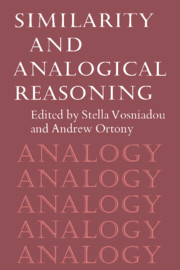Book contents
- Frontmatter
- Contents
- Preface
- List of contributors
- Similarity and analogical reasoning: a synthesis
- Part I Similarity and the structure of concepts
- Part II Analogical reasoning
- Part III Similarity and analogy in development, learning, and instruction
- 14 Analogical learning and transfer: What develops?
- 15 Analogical reasoning as a mechanism in knowledge acquisition: a developmental perspective
- 16 Remindings in learning and instruction
- 17 New approaches to instruction: because wisdom can't be told
- 18 Multiple analogies for complex concepts: antidotes for analogy-induced misconception in advanced knowledge acquisition
- 19 Comments on Part III: The activation and acquisition of knowledge
- Afterword: Comments on Parts I, II, and III: A framework for a theory of comparison and mapping
- Name index
- Subject index
15 - Analogical reasoning as a mechanism in knowledge acquisition: a developmental perspective
Published online by Cambridge University Press: 22 October 2009
- Frontmatter
- Contents
- Preface
- List of contributors
- Similarity and analogical reasoning: a synthesis
- Part I Similarity and the structure of concepts
- Part II Analogical reasoning
- Part III Similarity and analogy in development, learning, and instruction
- 14 Analogical learning and transfer: What develops?
- 15 Analogical reasoning as a mechanism in knowledge acquisition: a developmental perspective
- 16 Remindings in learning and instruction
- 17 New approaches to instruction: because wisdom can't be told
- 18 Multiple analogies for complex concepts: antidotes for analogy-induced misconception in advanced knowledge acquisition
- 19 Comments on Part III: The activation and acquisition of knowledge
- Afterword: Comments on Parts I, II, and III: A framework for a theory of comparison and mapping
- Name index
- Subject index
Summary
Whether or not we talk of discovery or of invention, analogy's inevitable in human thought, because we come to new things in science with what equipment we have, which is how we have learned to think, and above all how we have learned to think about the relatedness of things. We cannot, coming into something new, deal with it except on the basis of the familiar and the old-fashioned. The conservation of scientific enquiry is not an arbitrary thing; it is the freight with which we operate; it is the only equipment we have. We cannot learn to be surprised or astonished at something unless we have a view of how it ought to be; and that view is almost certainly an analogy.
[Robert Oppenheimer, September 1955]Interest in analogy has been generated to a large extent by a recognition of the role that analogy can play in the acquisition of new knowledge. Although our models of learning have stressed the importance of.prior knowledge in thinking, remembering, and learning, they have remained mainly silent on the processes whereby new knowledge is acquired. One mechanism that has been recognized by scientists, philosophers, and psychologists alike as having the potential of bringing prior knowledge to bear on the acquisition of, sometimes, radically new information is analogy.
My purpose in this chapter is to examine analogical reasoning, paying particular attention to the role it plays in knowledge acquisition. This question will be approached from a developmental point of view.
- Type
- Chapter
- Information
- Similarity and Analogical Reasoning , pp. 413 - 437Publisher: Cambridge University PressPrint publication year: 1989
- 88
- Cited by



